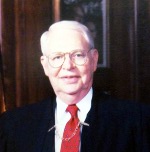
A life-long New Orleanian, Judge Sear was born on February 26, 1929. He was educated at the Isidore Newman School and Tulane University, earning his law degree in 1950. He was a captain in the United States Marine Corps from 1950-52 and an Orleans Parish Assistant District Attorney from 1952-55. He practiced law, principally with the firm of Stahl & Sear from 1955-71, and was also special counsel to the New Orleans Aviation Board. In 1971, he became one of the first United States Magistrate Judges in the Eastern District. A Republican, he served in that position until May 7, 1976, when he became United States District Judge after nomination by President Gerald R. Ford.
Among the notable matters he handled as a judge was the Brilab case, including a four-month trial of reputed crime boss Carlos Marcello and Louisiana Commissioner of Administration Charles Roemer, both of whom were convicted on public corruption charges. In affirming the convictions, the Fifth Circuit called Judge Sear's work "conscientious and thorough in its exposition of the law." U.S. v. Roemer, 70 F.2d at 706. In 1995, The Times-Picayune twice praised him editorially: once for his "decorous, buttoned-down" approach to a series of cases alleging discrimination in officer promotions in the New Orleans Police Department, and again as "a shining example of how a no-nonsense judge can protect the public even absent systemic reform," noting that "the public interest was carefully served by Judge Sear" in his rejection of a proposed settlement of the Ford Bronco II class action multi-district litigation cases.
Judge Sear was principally responsible for implementation of the judicial components of the Panama Canal Treaty of 1977, including closing and liquidation of the final 800-case docket of the U.S. court in the Canal Zone, where he worked for one week every eight weeks for 30 months. For this work, he was lauded in the September 21, 1982, Congressional Record and awarded the National Condecoration of the Order Vasco Nunez de Balboa, the highest honor bestowed by the Republic of Panama. Judge Sear was a confidante of Chief Justice William Rehnquist, who appointed him to the Executive Committee of the Judicial Conference of the United States and its Committees on Magistrate Judges, Bankruptcy System, Bankruptcy Rules and Civil Procedure. He was a member of the prestigious Judicial Panel on Multi-District Litigation and was influential in making the Eastern District a frequent transferee court for MDL cases.
Judge Sear was an active volunteer and contributor to the Tulane Law School, serving as an Adjunct Professor of Law for 25 years, a member of its Dean's Council and Board of Visitors and a Master of the Bench of its Inn of Court. He was president of the Congregation Temple Sinai and the Tulane Medical Center Hospital and Clinic. Judge Sear died on September 6, 2004, survived by his wife of 53 years, Lee Edrehi Sear; his children, William Sear II and Jane Sear Cohn; and six adoring grandchildren.
